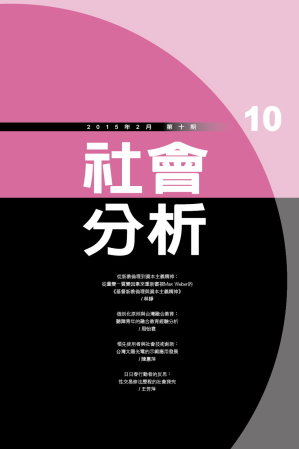Hot News

- 出版單位:東吳大學社會系;輔仁大學社會系;世新大學社會心理學系
| 中文篇名 |
日日春行動者的反思:性交易修法歷程的社會探究 免費試閱 | |
|---|---|---|
| 英文篇名 |
COSWAS’ Campaign for Legal Reform on the Sex Trade in Taiwan: A Social Inquiry | |
| 作者 | ||
| 中文摘要 |
日日春協會從2000年起推動性交易除罪化及合法化的修法運動,在多年的努力下終於在2009 年將《社會秩序維護法》第80條「罰娼條款」推進修法議程。本研究係針對日日春及筆者個人在性交易修法的社會探究(social inquiry)歷程,以「行動研究」為方法進行反映性研究。日日春及筆者個人作為修法行動者,在2009~2011 年修法的緣起和轉折中,針對官方不想根本改革,只圖在回應社會多方爭議中,策略性地修出一個民意支持的版本,日日春是如何行動。 | |
| 英文摘要 |
COSWAS has been campaigning for the decriminalization and legalization of the sex industry since the year 2000. After nearly a decade of campaigning, Article 80 of the “Public Order Maintenance Act”, which penalizes sex sellers, was amended in 2009. Based on “Action Research”, this paper examines the campaign process as a form of social inquiry. COSWAS and the author have been actively pushing for legal reform in favor of the sex workers, and challenging the government for the superficiality of its response right up to 2011. However, the Taiwan government has never intended to make any fundamental changes to the existing law; it just wants to be seen to respond to the debates by implementing a legal version that can by and large, satisfy popular opinion. This paper critically examines the actions and strategies of COSWAS and its failure and success. | |
| 關鍵詞 |
日日春、性工作者、性工作權運動、性交易、《社維法》第80條、COSWAS、sex workers、sex workers’ rights movement、sex trade、Public Order Maintenance Act: Article 80 | |
| 刊名 | ||
| 期數 | ||
| 起訖頁 |
126-140 | |
| 出版單位 |
東吳大學社會系;輔仁大學社會系;世新大學社會心理學系 | |
| DOI | ||
| QRCode |
| |
| 上一篇 |


